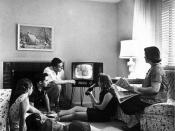Television Effects on Youth One of the main activities that Americans participate in during their free time is watching the television. The average American spends two hours a day watching television. Since it's invention in the 1950s, the television has been a source of enjoyment and information for American citizens. Although television can be an effective tool for educational and informative reasons it can also be a influential factor for the younger generation, especially when watched in excess. Television has the potential of promoting illiteracy, decreasing creativity, encouraging violence, effecting social interaction, distorting self-image, and creating stereotypes.
When children spend their free time in front of the television they usually spend less time reading and studying. Numerous studies demonstrate a strong link between the increase of television watching and the decline in reading and literacy. As they watch television children seem to loose interest in their own creativity and imagination and tend to accept whatever is put in front of them.
They become content with watching other people's lives go by on a screen instead of experiencing their own lives.
Television also seems to encourage violence to an easily influenced younger audience. By the time the average American child has graduated from high school they have seen over 18,000 murders and 200,000 acts of violence. Seeing numerous accounts of violence on the screen often causes children to mimic these acts. Many countries have banned certain movies or shows for this very reason. Children see these things on television and want to try it for themselves and often end up hurting themselves and others.
Through television children are presented with a distorted picture of self-image and stereotypes. The American youth is shown picture perfect models and long to achieve that picture however they can or they think they are not...


